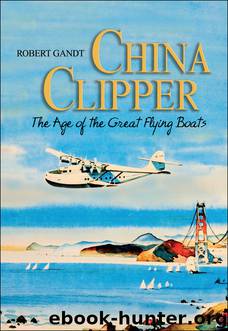China Clipper by Robert Gandt

Author:Robert Gandt [Gandt, Robert]
Language: eng
Format: epub
ISBN: 9781612514246
Publisher: Naval Institute Press
16
China Clipper
Ed Musick was a reluctant hero. He abhorred the flashbulbs and handshakes and the constant clamor for remarks about what, to him, was simply a job.
But as the day neared for him to take the China Clipper across the Pacific, Ed Musick’s life changed. Each day became a steady torment of interviews and photographs and public speeches. The press wanted to know about his private life (prosaic), his tastes in spirits (none), his outside interests (minimal). Time would report in its cover story only that “he lives quietly with his blonde wife, Cleo, has no children, likes baseball, Buicks, apples, ham and cheese sandwiches, vacations in Manhattan.”
There was little about Musick that would fill space in the tabloids. In photographs he appeared as a man medium in height and slight of build, slightly stoop-shouldered, with thinning black hair. He had a permanent five-o’clock shadow that defied any razor.
Musick’s shy, laconic comments to the press had become the particular frustration of Pan American’s public relations department. When he flew the S-42B on the proving flight to Hawaii, the press director had pleaded for newsworthy reports. Would Musick please send something—anything—that was publishable?
Musick balked. “I’m a pilot, not a newspaperman. I wouldn’t know what to send.”
“Send something about the sunset over the Pacific.”
Okay, Musick agreed. From over the ocean he radioed: “SUNSET, 0639 GMT.”
That was Musick.1
* * *
Born in 1894 in St. Louis, Musick had grown up in Los Angeles where, like Glenn Martin, he became obsessed with the craft of flight. His first airplane, which he built himself, crashed without flying. Musick worked as a mechanic, first on racing cars and then at Martin’s new Los Angeles aircraft factory. After he learned to fly, he became a professional air-show pilot. He performed along the Pacific Coast as “Monseer Mussick, the famous French flier,” or, at other times, as “Daredevil Musick.” Along the way Musick was acquiring a passion for precision. He studied the causes of the accidents that befell his colleagues and began to devise his own methodical, meticulous procedures.
With the onset of WW I, Musick worked as a civilian flight instructor for the army, then received his commission as a second lieutenant in the Marine Corps Reserve. Designated Naval Aviator Number 1673, he spent the rest of the war instructing navy student flyers in Miami.
In the postwar years Musick, like most professional aviators of the day, took whatever flying jobs he could find. What he found was usually dangerous and frequently illegal. He flew flying boats to the Bahamas and to Cuba for the over-water airline Aeromarine until the company folded. It was the era of Prohibition. For lack of better employment Musick made a living flying booze from offshore supply boats to clandestine fields on the East Coast.
In 1926 his name came to the attention of the operations manager of Philadelphia Rapid Transit Airline. The manager, whose reputation for meticulousness equaled Musick’s, was a Dutch immigrant named Andre Priester. When Priester moved on to a new airline called Pan American, he took Musick with him.
Download
This site does not store any files on its server. We only index and link to content provided by other sites. Please contact the content providers to delete copyright contents if any and email us, we'll remove relevant links or contents immediately.
| Automotive | Aviation |
| History | Mass Transit |
| Owner's Manuals & Maintenance Guides | Railroads |
| Reference | Ships |
Small Unmanned Fixed-wing Aircraft Design by Andrew J. Keane Andras Sobester James P. Scanlan & András Sóbester & James P. Scanlan(32157)
Navigation and Map Reading by K Andrew(4570)
Endurance: Shackleton's Incredible Voyage by Alfred Lansing(3876)
Wild Ride by Adam Lashinsky(1664)
And the Band Played On by Randy Shilts(1632)
The Box by Marc Levinson(1607)
Top 10 Prague (EYEWITNESS TOP 10 TRAVEL GUIDES) by DK(1575)
The Race for Hitler's X-Planes: Britain's 1945 Mission to Capture Secret Luftwaffe Technology by John Christopher(1534)
The One Percenter Encyclopedia by Bill Hayes(1475)
Girls Auto Clinic Glove Box Guide by Patrice Banks(1375)
Trans-Siberian Railway by Lonely Planet(1354)
Looking for a Ship by John McPhee(1328)
Batavia's Graveyard by Mike Dash(1309)
Fighting Hitler's Jets: The Extraordinary Story of the American Airmen Who Beat the Luftwaffe and Defeated Nazi Germany by Robert F. Dorr(1308)
Troubleshooting and Repair of Diesel Engines by Paul Dempsey(1291)
Bligh by Rob Mundle(1281)
TWA 800 by Jack Cashill(1258)
The Great Halifax Explosion by John U. Bacon(1237)
Ticket to Ride by Tom Chesshyre(1236)
